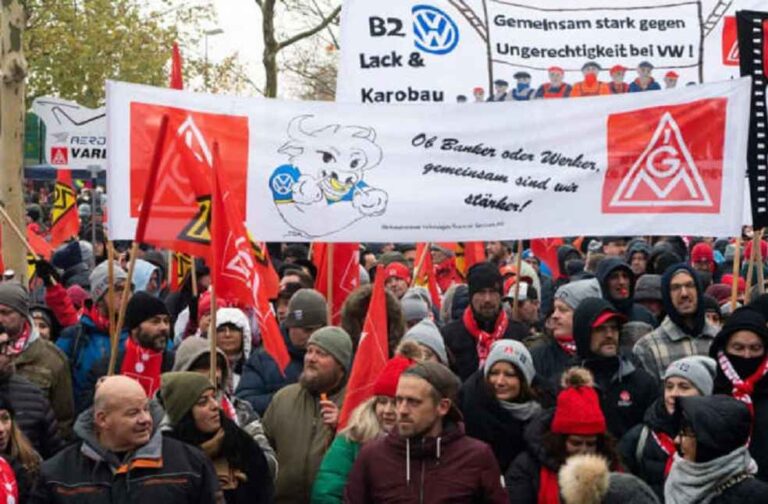Thousands of Volkswagen workers initiated a strike on Monday due to growing concerns over job security and financial stability within the German auto giant. This move comes as Volkswagen grapples with severe challenges including high domestic manufacturing costs, a slow transition to electric vehicles, and stiff competition in its crucial Chinese market.
Volkswagen, which employs approximately 120,000 staff in Germany, is considering closing some of its local plants—a decision that has never been seen before in the company’s history. This announcement in September prompted the powerful IG Metall Union and the workers’ council to intensify their efforts to safeguard jobs.

Thorsten Groeger, a negotiator for IG Metall, declared the start of ‘warning strikes’ at all plants, following the company’s recent rejection of the union’s job protection proposals. Groeger warned that this could lead to “the toughest wage dispute Volkswagen has ever seen,” accusing the company of disregarding collective bargaining agreements and exacerbating tensions.
Despite the union’s combative stance, Volkswagen has expressed a commitment to resolving the issues through ‘constructive dialogue’ and stressed its respect for workers’ rights, including taking steps to ensure critical deliveries are not disrupted during the strike.
The turmoil at Volkswagen is set against a backdrop of broader economic challenges in the eurozone’s largest economy, which is also facing political uncertainty with upcoming elections in February. The company’s troubles were starkly illustrated in its recent financial reports, which showed a 64% drop in third-quarter profits to €1.58 billion ($1.7 billion).

Compounding these difficulties, Volkswagen recently sold its operations in China’s Xinjiang region amid both economic pressures and human rights concerns. The auto industry in Europe faces additional hurdles with the EU planning to impose significant tariffs on Chinese-made electric vehicles, a move that could provoke retaliatory measures affecting companies like Volkswagen.
The crisis is not isolated to Volkswagen alone; other major German car manufacturers such as BMW and Mercedes-Benz have also revised their profit forecasts downward. This industry-wide downturn reflects weak demand and a lagging shift towards electric vehicles, with key suppliers announcing job cuts and scaling back operations.
GENERAL | KTM Restructuring: Indian Operations with Bajaj Auto Remain Unaffected





